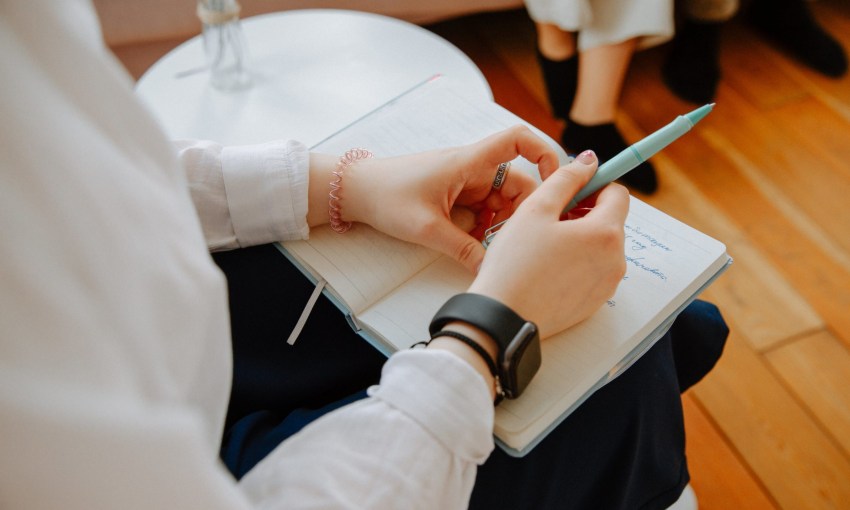Psychologist Jen Riches offers three things you can do to continue working on your mental wellbeing.
How to take control of your mental health
Founder of Net Psychology, Jen Riches says recent studies have shown levels of psychological distress in the general community have increased during 2020, and people with pre-existing mental health conditions have been feeling worse.
Net Psychology
64a Broadway, Glenelg South 5045
Wednesday: 8:30am ’til 5pm
Friday: 8:30am ’til 7:30pm
Saturday: 8:30am ’til 5pm
Net Psychology offers in-person, online, and after-hours therapy sessions. Bookings can be made online.
This article was produced in collaboration with Net Psychology.
Students and people experiencing unemployment have been particularly affected, she says.
“I think it’s been a really challenging time. It’s disrupted people’s plans, particularly with holidays, birthday celebrations, even funerals. Not being able to do those normal acts that we have planned can be really upsetting,” Jen says.
“That social interaction is so important to our mental health, and when we can’t see our loved ones and our friends and do those things, it has a big impact on how we feel.”

Jen Riches, Founder of Net Psychology
Integrative psychotherapist Sarah Short agrees.
“As we’re all aware as a community, a lot of people have not been able to work or they’ve lost their employment due to COVID, which has left them in a state of despair,” Sarah says.
“Therefore, they’re finding that they’re home and they’re alone and it’s very, very isolating.”
As more people deal with mental health issues, particularly depression, Jen says taking care of your mental health is just as important as taking care of your physical health.
Jen recommends three skills to practice every day to help take control of your mental health.

Activity scheduling
Jen says scheduling a combination of fun and fulfilling activities daily could help people feel better overall.
“Often when we feel anxious or depressed, we stop doing things,” she says.
“So we stay at home, we might just stay in bed, we kind of give up and we just don’t have any energy to do stuff anymore. And unfortunately it makes our anxiety and our depression bigger.”
Activities that would be helpful range from having a coffee with a friend to doing the dishes.
“That helps us to feel a sense of achievement and competence, which helps with our mental health,” she says.
“If you’re feeling really down and anxious, just starting out small is really important.
“So, it might be just one small thing that you can schedule in each day, and then you might like to build that up a bit over time.”
Jen also says people should not wait until they are motivated to do something.
“Action is really the first step, so don’t wait for yourself to get motivated. Just get started on something, and that motivation will eventuate.”
Thought challenging
People pay more attention to their feelings rather than the type of thoughts they are having, so Jen says it’s important to question negative thinking.
“Often in line with those negative thoughts are unhelpful thinking styles,” she says.
“We might catastrophise, we might have some black and white thinking, we might believe everything is to do with us when we’re feeling depressed or anxious.
“So, the first step is just recognising those thoughts, and being a bit like a detective, and sussing out those thoughts and questioning them.”
Jen suggests asking yourself: ‘Is that thought true?’, ‘How realistic is that thought?’, ‘Are there any other explanations for that particular thought?’, ‘Is there something that I’m ignoring?’.
The next step is to figure out if those negative thoughts are helpful, and, if not, coming up with a more balanced way of thinking.
“If someone had the thought, ‘COVID’s been the worst possible thing that I could ever imagine,’ we might look a bit deeper into that thought and say, ‘Is that really helpful if I think that?’” Jen says.
“We might have an alternative thought that could be, ‘Maybe lockdown has been stressful for me but it’s also given me some new ideas for my business moving forward.’
“So, when we start to have some more balanced thoughts, it’s likely that we’ll start to feel a bit better too.”
Seeking help
Sarah Short says there is no shame in seeking help for mental health.
“You see a lot of public speakers now and people in the media coming out and saying they’ve got anxiety and depression,” she says.
“There’s nothing to be ashamed of. We’re all human beings, and life is challenging enough as it is without having to worry about how people are going to treat us if we come out saying we’ve got a problem with our mental health.”
Jen says it’s perfectly OK to get some professional support if you’re finding it really hard to function in life and are not able to do things that you can normally do.
“Net Psychology provides assessment and therapy to adolescents and adults with mental health issues,” Jen says.
“I’m a psychologist, and that means I have completed six years of training, and I’m registered with the Australian Health Practitioner Regulation Agency.
“I’m here to help you with any mental health issues that you might have and provide you with some therapy and support in line with your goals.”
Other than her Glenelg-based practice, Jen also offers online therapy sessions, which she says is just as effective as face-to-face.
If you are thinking about seeking help but are worried about the cost, Medicare now provides a rebate for up to 20 sessions per calendar year if you obtain a mental health care plan from a GP.
“I think it’s important to remember that people do get better, and people can go on to lead happy and successful lives… Don’t give up.”
Bookings can be made with Net Psychology online, with after-hours options available as well.
If seeking urgent help, call Lifeline: 13 11 14. If it is an emergency, call 000.




